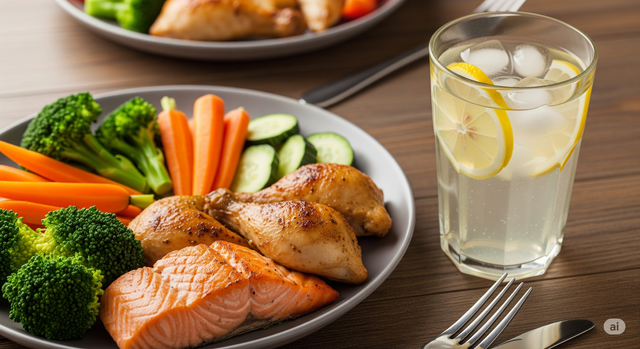Everydayhealth news site quotes experts pointing out that the following familiar healthy foods are only good if we do not abuse them.
Lemon
According to Holly Klamer, a nutritioneducator in Michigan (USA), lemon water is low in calories and sugar but can damage your tooth enamel and make you more susceptible to cavities.
When sipping lemonade or other acidic drinks, experts recommend using a straw and rinsing your mouth afterward. This can lessen any side effects.
Some foods are healthy but you should not eat too much - Photo: AI
Fish
According to the US Food and Drug Administration (FDA), fish is a source of protein, vitamin B12, zinc, iodine, and omega-3 fatty acids. In fact, there are Twenty studies involving hundreds of thousands of people have shown that eating one or two 2-ounce (oz) servings of fatty fish per week reduces the risk of death from heart disease by 36 percent, according to Everydayhealth .
However, if you eat too much of certain types of fish, you may increase your risk of mercury poisoning.
According to the FDA, it is necessary to avoid fish with high mercury content such as king mackerel, shark, bigeye tuna, orange grouper, swordfish, tuna... Better options include catfish, flounder, haddock, salmon, scallops, squid... recommended based on the criteria of "containing the least mercury".
Cruciferous vegetables
Kale, broccoli, cabbage, and other cruciferous vegetables are rich in nutrients like folate and vitamin K. They are also high in soluble fiber, which can contribute to excess gas production. Eating too much of these vegetables, especially in amounts your body is not used to, can cause digestive upset.
Additionally, cruciferous vegetables can affect the way your thyroid uses iodine. Eating too many of them every day can cause problems for people who are iodine deficient, according to Holly Klamer.
Foods rich in beta carotene
Carrots, cantaloupe, and sweet potatoes are all rich in beta carotene. This antioxidant helps boost immunity and reduce the risk of heart disease and cancer, and also plays a role in vision and eye health.
However, foods rich in beta carotene contain pigments that can turn your skin yellow or orange, a condition called carotenemia. Excessive and prolonged consumption of foods rich in carotene means more than 30 milligrams (mg) of beta carotene per day. Studies have shown that one carrot has about 4 mg of beta carotene. So eating more than 7 carrots per day can lead to carotenemia.
Carotenoidemia is easily confused with jaundice, a more serious condition that causes the skin and whites of the eyes to turn yellow.
Source: https://thanhnien.vn/nhung-thuc-pham-lanh-manh-nhung-khong-nen-an-qua-nhieu-18525070906543578.htm





































































































Comment (0)